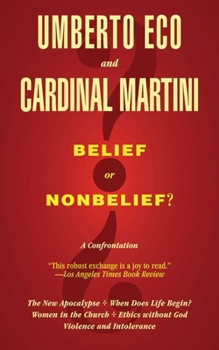Belief or Nonbelief?: A Confrontation
Select Format
Select Condition 
Book Overview
In this stimulating dialogue these two great men, who stand on opposite sides of the church door, discuss some of the most controversial issues of the day. One is a respected scholar and one of the... This description may be from another edition of this product.
Format:Paperback
Language:English
ISBN:1611456894
ISBN13:9781611456899
Release Date:October 2012
Publisher:Arcade Publishing
Length:112 Pages
Weight:0.34 lbs.
Dimensions:0.5" x 4.9" x 7.7"
Customer Reviews
5 ratings
Very dense, but rewarding
Published by Thriftbooks.com User , 15 years ago
Eco and Martini are hard reads--there's no disputing it. I first read the book as a senior in AP English, and even as the top of my class, I struggled through passages. It's beautifully thoughtful, and very rewarding if you choose to read through it, though.
How a Dialogue should be!
Published by Thriftbooks.com User , 17 years ago
This exchange between Umberto Eco, an expert philosopher and secularist and a Cardinal of the Catholic Church is nothing short of enlightening. The two have obvious disagreements, but the exchange, which covers topics such as the apocalypse, the right to life, and where morals come from, is nothing short of sincere and well meaning on both sides. This is how a dialogue between believers and non believers should be! It is much more worthwhile than some "Dawkins vs. random fundimetalist" type deal. Eco and the Cardinal don't really answer any of the questions in as much detail as I would have hoped, but I guess that was the limit of only allowing one reply.
a beautiful book to comfort us all
Published by Thriftbooks.com User , 20 years ago
In these beautifully crafted, philosophical yet clear letters, Cardinal Martini and Umberto Eco discuss the questions that have been raised by many peoples in many lands and in many cultures since philosophy began. They exchange views on the secular expectation of the apocalypse and our resultant consumer culture; on women in the church; on when life begins; and on how a secular man can ground his ethics.The thorough Jesuit education these great minds received is as evident as their deep humanity. And, while a student of philosophy and ethics will no doubt be entranced by the clear and logical arguments Eco and Martini present, a less philosophically inclined mind may find comfort.For in the end, Martini and Eco reassure us that, no matter whether you are secular or religious; no matter what your culture, there are universal values that are common to us all. It is a message well worth hearing in this relativistic and politically correct world.
interesante intercambio de ideas
Published by Thriftbooks.com User , 23 years ago
EN QUE CREEN LOS QUE NO CREENUMBERTO ECO Y CARLO MARIA MARTINIEste pequeño intercambio de ideas entre estas dos grandes figuras es un excelente ejercicio literario, filosófico e ideológico de carácter muy profundo y ha sido un libro de un gran impacto en mi vida. Tenia tiempo que no leía una obra que me pusiera a pensar y repensar en los valores de la sociedad moderna y el papel de la iglesia y los laicos. Debo decir que después de este libro veo las instituciones religiosas y sus creyentes con mucho mas respeto que antes. Los veo a la luz de los errores pasados, pero también los veo en su función de reformar y reformarse, en una constante búsqueda de la verdad que parece eludirnos pero veo que lentamente el germen de la tolerancia, la comprensión y el amor hacia ese otro que es un alter ego esta ganando terreno. Respecto a la pregunta de Martini en la que no se explica sobre que basa la certeza y la imperatividad de su actuar moral quien, para fundar la cualidad de absoluto de una ética, no pretende hacer un llamado a principios metafísicos, es decir no busca de Dios a la hora de hacer el bien, encuentra en Eco una respuesta contundente y posmodernista en que los individuos dependemos de la aceptación del otro para poder vivir y es esa cohesión de hechos la que nos hace no lastimar a los demás y es también la razón que lleva a los filósofos a filosofar, a los escritores a escribir; dejar un mensaje para los otros en un futuro para que sepan y vean lo que consideramos bello en nuestro tiempo y un poco de nosostos en esas cosas. Dios existe porque necesitamos que exista ese padre, esa figura que significa protección en un mundo donde hasta el momento estamos solos. Los no creyentes y los creyentes debemos respetarnos y aprender a encontrar puntos de consenso, para conservar nuestra raza y mantener viva a nuestra madre, Gea.Luis Mendez
You must read the italian or the spanish versions!
Published by Thriftbooks.com User , 24 years ago
The book is good. But the reactions of a variety of intellectuals in the SECOND HALF of the non english versions are as enjoyable. Why were they left aside in this translation? The whole purpose of the magazine that asked Martini and Eco to start a dialogue, was to open it. Why the trimming? Also, why was the title changed to a flashy style? The original could be better translated to "What do non believers believe in" or else. I can see other opinions on the book are produced by an incomplete translation or a misleading title.





